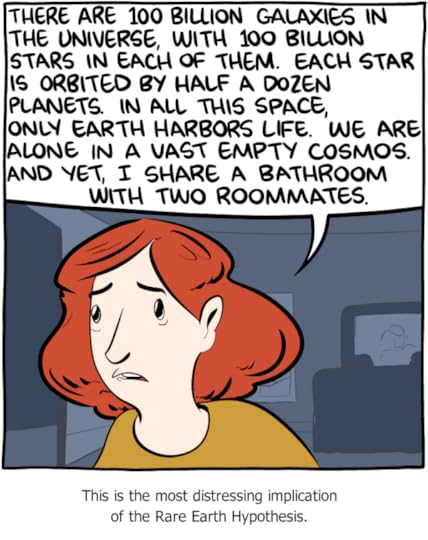Briane Pagel's Blog: Thinking The Lions, page 14
March 20, 2016
March 19, 2016
Hey look it's Jonathan Franzen...
Published on March 19, 2016 18:49
Book 18: I took the time to look up facts about the author and a Supreme Court justice but couldn't in the end be bothered to look up a British actor, which is about the amount of effort this book is worth.
 There are books that I've come to think as having been written to become -- or try to become-- a TV series or movie. This was one of them.
There are books that I've come to think as having been written to become -- or try to become-- a TV series or movie. This was one of them.What I mean by that is that the book seems calculated, and overly so, to appeal to a broad swath of people; they are the book equivalent of a pop song from a boy band, feeling focus-grouped and time-worn. It's a hard quality for me to put into words, but in a family-friendlier version of Potter Stewart, I know it when I see it.
Midnight Riot feels that way, slickly commercial and pre-packaged, and while it doesn't make for a bad book -- it's not Armada-- it feels like a bit of a letdown, given what it might have been if it didn't feel like the author was so desperately trying to sell this concept to Syfy.
Midnight Riot is about a cop in London who, originally slated for paperwork, ends up accidentally bumping into a ghost at a murder site and gets propelled into a secret branch of the London constabulary, one devoted to dealing with the supernatural. With his supervisor, a wizard, Peter-- the main character -- is responsible for investigating a string of murders pulled off by magic while also, in a subplot that utterly fails to link into the main plot, trying to end a feud between the gods of the upper and lower Thames.
That set up is so pat that it almost seems piling on to mention the other stock-ish parts of the book. The most glaring was the pair-up between Peter and his friend/sometimes partner, a girl named Lesley. Lesley is apparently beautiful and a great cop and tough as nails and Peter is in love with her but can't tell her and so on and so forth, and it feels not only done before, but straight out of central casting. Peter's boss, too, is a stiff-upper-lip moustached fancy Londoner who carries a trenchcoat and a silver-tipped cane. There is the requisite tough, burly supervisor who knows about magic and hates it for some reason -- that's never explained and obviously just there to throw a potential conflict in-- and in fact nearly every character feels as though it's just from another run-of-the-mill cop or wizard show.
This has the effect of glossing over the more interesting elements of the story: the river-gods of the upper and lower Thames, and all the rivers in and around London, who have some sort of "arrangement" that's never clearly spelled out, an arrangement that's been tested by Peter becoming an apprentice to his boss/supervisor, as well as by an incursion from the god of the upper Thames. The book was titled Rivers Of London in the UK, and is the first in a series of books all set in that world; presumably later books might flesh out more of the characters and the magical setup. This book is more of an origin story, which was a drawback, too: most origin stories are awful, and this one is a step above that.
The truly interesting parts of the book were the ones dealing with the rivers, and some of the more esoteric bits of magic, like revenants and whatever the housekeeper that cares for the magic house Peter and his supervisor stay in is supposed to be. But even those interesting bits get glossed over to make the book more television friendly. For example, the villain in the book is presumed to be a revenant, rather than a ghost. That difference is never clearly explained, which is problematic enough, but late in the book [SPOILER ALERT!] it turns out that the thing they thought was the revenant was in fact just a ghost itself being manipulated by the revenant, and then the revenant turns out to be some sort of uber-spirit that is killed by being taken back in time to the beginning of London, where it is stabbed as a human sacrifice to the river god. This all is not done terribly well and feels both rushed and a bit deus ex machina, almost literally since the clue and the sacrifice are both assisted by actual gods.
There's also a good bit about how magic works and draws on silicon and things: the theory is that magic is created by living things and that silicon in computers and phones has magic energy because these machines are getting 'smarter,' becoming more humanlike. That is a brilliant concept that goes entirely undeveloped and which ultimately plays no role in the book, that I could discern. Again, if this is an origin story and that's setup for a later event in another book, well, that's why I hate origin stories.
A further flaw is that system of magic itself. I'm not one of those people who demands that everything be internally consistent and that you have a fully-developed system of magic or science or whatever. I'm fine with things like "the Force" that can just do whatever -- provided that you don't then try to systematize it, like with midichlorians. If you are going to go to the trouble of creating rules for your magic or science or whatever, stick to them. Aaronovitch spends a great deal of time having Peter explore the mechanisms of magic, and then seems to blow it. Take the revenant: for about 1/3 of the book they're trying to find the thing's grave so they can take its bones and grind them up with salt and throw them in the ocean, which is the only way to kill a revenant. Then they just go back in time, using a power that the maid suddenly has, to kill it with a spear provided by the river god. The magic rules seem to only matter when it's important to the story to have some sort of limit, and then don't matter when it's not important or when the author needs to write his way out of a corner.
Having looked into Aaronovitch a bit, I saw that he's not only written this series but he's also done comics and TV work, so I guess I'm not surprised how this book feels. It's not an awful book; it just feels superficial and not all it could be. There was a lot of good stuff here, but it got buried under the dream of having ... who's a British actor? I had to ask Sweetie, and she said "Eddie Redmayne" but he's not the right type... having Chris Hemsworth play the lead in a Showtime series based on the book.
There are better books out there. Skp this one and read American Gods, or Kraken by China Mieville, or The House On The Corner by Andrew Leon.
BONUS thing about the book: in going to get the cover image I learned that there was some controversy over the cover: Originally the US version had a 'photorealistic' version of the hero, Peter. In later editions the face was blurrier, which people said was racist and designed to hide the fact that Peter is African-American (although him being British I guess he's not African-American); I find that funny because Peter's race is almost completely irrelevant to the story, and in fact is so nonessential that I forgot he was black, and at one point Peter said something about how black women have kids just to help them do the housework and I was offended by what felt like offhanded racist remarks until I remembered who the protagonist was. Peter's race feels as tacked-on and superficial as the rest of the book.
Published on March 19, 2016 13:06
March 18, 2016
We had to go get a new washer and saw an AWESOME DEAL
Published on March 18, 2016 19:14
March 17, 2016
If the SCIENTISTS abandon science is it any wonder REGULAR PEOPLE don't have any idea how science works?
I know this comic

is just a joke, but it's from Saturday Morning Breakfast Cereal, a comic that makes lots of jokes about science and which theoretically has its science correct (insofar as the author of the comic makes a point of saying how much he liked studying physics, I guess; he doesn't have much more formal scientific education than I do.)
The "Rare Earth 'Hypothesis'" is supposed to be a rejoinder to "Drake's Equation," which isn't an equation at all; Drake's equation admittedly isn't intended to be mathematical or scientific in nature, but simply to "stimulate talk" on extraterrestrial life. Nonetheless, it was presented by scientists, including Carl Sagan, as an "actual equation." Did that help contribute to the dumbing-down of America? You'll have to decide for yourself. (Hint: Yes.)
In Drake's Equation String of nonsensical variables 'scientists' make a series of assumptions about how many stars there are, how many planets those stars have on average (averages being the most useless measurement of statistics, but the most common), etc etc down to where they come up with 43,000,000,000 potential planets with life on them. It is similar, in scientific rigor, to me doing my budget by saying
And then being surprised when my mortgage check bounces. But Drake's Equation was rebutted (!) by the "Rare Earth Hypothesis," which actually made it into a book. Here is the "Rare Earth String of Nonsensical Variables":

"N" is the number of stars in the Milky Way. Even poor excuses for scientists such as the authors of the book this set of assumptions was popularized in admit that the number of stars in the Milky Way is a complete guess; the Wikipedia entry on this 'equation' says the number could be anywhere from 100,000,000 to 500,000,000 -- but even that is a guess.
"My best guess," I told my wife about how much I would earn at my new job, "Is somewhere between 100,000 and 500,000."
Anyway, from there the 'equation' goes on to make other guesses about things we don't know, all in the name of 'science', trying to point out ... something? Apparently it is to show that intelligent life is extremely rare, "intelligent" being defined apparently as "identical to us."
Here's the thing: the nearest earthlike planet we've found is 14 light years away. For that planet alone to have sent us a signal, it would have to have evolved life at or around the same time as us, or at a faster rate than us, because we only in the past 100 years have devised a way to say things to outer space. That planet then would have had to aim its radio waves or light signal in such a way as to hit a tiny target 14 light years away and do so in an manner which we could interpret as a communication.
And those beings would have had to want to do that.
All of these "equations" assume that life on other planets evolved faster than us, or earlier than us, or better than us, and thus have some higher capabilities than us, and they thus ignore the only evidence they have, which is US: if scientists simply said "based on all the evidence we have, it takes about 6,000,000 years for intelligent life capable of sending radio signals to evolve," and then thought about how hard it's even been for us to find earthlike planets in the universe, and then took up the easily-calculable question of what sort of accuracy would be needed to target another planet with a radio wave --
-- something we already know: it wasn't until 1936 that any signal of ours could even get out of Earth's ionosphere, and it would take about 110,000,000 watts of power to get an intelligible signal to the nearest star. Most broadcasts are done at less than 5,000,000 watts, and as pointed out in that link, now that we are using digital TV, and the like, we are becoming less detectable --
if scientists just looked at what we do know and hypothesized from facts the way science is supposed to work, we might actually have made some progress towards communicating with other planets or detecting their communications.
Instead, we wallow around in fake equations and pop 'science' books designed to make money for people rather than be correct or scientific in any way. It's virtually a guarantee that any scientist, doctor or other 'highly educated' person you see on TV or elsewhere in pop culture is about as scientifically rigorous as those charlatans who used to hold seances.

is just a joke, but it's from Saturday Morning Breakfast Cereal, a comic that makes lots of jokes about science and which theoretically has its science correct (insofar as the author of the comic makes a point of saying how much he liked studying physics, I guess; he doesn't have much more formal scientific education than I do.)
The "Rare Earth 'Hypothesis'" is supposed to be a rejoinder to "Drake's Equation," which isn't an equation at all; Drake's equation admittedly isn't intended to be mathematical or scientific in nature, but simply to "stimulate talk" on extraterrestrial life. Nonetheless, it was presented by scientists, including Carl Sagan, as an "actual equation." Did that help contribute to the dumbing-down of America? You'll have to decide for yourself. (Hint: Yes.)
In Drake's Equation String of nonsensical variables 'scientists' make a series of assumptions about how many stars there are, how many planets those stars have on average (averages being the most useless measurement of statistics, but the most common), etc etc down to where they come up with 43,000,000,000 potential planets with life on them. It is similar, in scientific rigor, to me doing my budget by saying
There are 100,000 different kinds of jobs in America; on average those jobs pay $200,000 per year, I have worked at 28 jobs in my lifetime, accordingly I have $1,000,000 in the bank.
And then being surprised when my mortgage check bounces. But Drake's Equation was rebutted (!) by the "Rare Earth Hypothesis," which actually made it into a book. Here is the "Rare Earth String of Nonsensical Variables":

"N" is the number of stars in the Milky Way. Even poor excuses for scientists such as the authors of the book this set of assumptions was popularized in admit that the number of stars in the Milky Way is a complete guess; the Wikipedia entry on this 'equation' says the number could be anywhere from 100,000,000 to 500,000,000 -- but even that is a guess.
"My best guess," I told my wife about how much I would earn at my new job, "Is somewhere between 100,000 and 500,000."
Anyway, from there the 'equation' goes on to make other guesses about things we don't know, all in the name of 'science', trying to point out ... something? Apparently it is to show that intelligent life is extremely rare, "intelligent" being defined apparently as "identical to us."
Here's the thing: the nearest earthlike planet we've found is 14 light years away. For that planet alone to have sent us a signal, it would have to have evolved life at or around the same time as us, or at a faster rate than us, because we only in the past 100 years have devised a way to say things to outer space. That planet then would have had to aim its radio waves or light signal in such a way as to hit a tiny target 14 light years away and do so in an manner which we could interpret as a communication.
And those beings would have had to want to do that.
All of these "equations" assume that life on other planets evolved faster than us, or earlier than us, or better than us, and thus have some higher capabilities than us, and they thus ignore the only evidence they have, which is US: if scientists simply said "based on all the evidence we have, it takes about 6,000,000 years for intelligent life capable of sending radio signals to evolve," and then thought about how hard it's even been for us to find earthlike planets in the universe, and then took up the easily-calculable question of what sort of accuracy would be needed to target another planet with a radio wave --
-- something we already know: it wasn't until 1936 that any signal of ours could even get out of Earth's ionosphere, and it would take about 110,000,000 watts of power to get an intelligible signal to the nearest star. Most broadcasts are done at less than 5,000,000 watts, and as pointed out in that link, now that we are using digital TV, and the like, we are becoming less detectable --
if scientists just looked at what we do know and hypothesized from facts the way science is supposed to work, we might actually have made some progress towards communicating with other planets or detecting their communications.
Instead, we wallow around in fake equations and pop 'science' books designed to make money for people rather than be correct or scientific in any way. It's virtually a guarantee that any scientist, doctor or other 'highly educated' person you see on TV or elsewhere in pop culture is about as scientifically rigorous as those charlatans who used to hold seances.
Published on March 17, 2016 05:14
March 16, 2016
Well he's right
This morning when I went into the kitchen to make some coffee, I found Mr Bunches on the kitchen floor:
 "Why're you sitting on the floor?" I asked him.
"Why're you sitting on the floor?" I asked him.
"I'm not sitting. I'm laying," he answered.
"Well, why are you laying on the floor?" I asked.
"I have to wait until we go," he said, meaning until we go outside for the bus.
"Why don't you wait on the couch, or at the table?" I asked him.
"Because I'm on the floor," he said.
"Are you okay? Are you sad? Are you nervous?" I asked him.
"No," he said.
"So why are you on the floor?" I said again.
"It's unexpected," he said, and wouldn't say any more.
 "Why're you sitting on the floor?" I asked him.
"Why're you sitting on the floor?" I asked him."I'm not sitting. I'm laying," he answered.
"Well, why are you laying on the floor?" I asked.
"I have to wait until we go," he said, meaning until we go outside for the bus.
"Why don't you wait on the couch, or at the table?" I asked him.
"Because I'm on the floor," he said.
"Are you okay? Are you sad? Are you nervous?" I asked him.
"No," he said.
"So why are you on the floor?" I said again.
"It's unexpected," he said, and wouldn't say any more.
Published on March 16, 2016 04:27
Thinking The Lions
Do you think people invented "Almond Joy" and then thought "we could subtract the almonds and make it a completely different thing?" or did they come up with "Mounds" first and then someone had a brot
Do you think people invented "Almond Joy" and then thought "we could subtract the almonds and make it a completely different thing?" or did they come up with "Mounds" first and then someone had a brother-in-law in the almond business? And anyway did you ever notice that the almond creates a little mound and that "Mounds" are flat?
I'm probably overthinking this. ...more
I'm probably overthinking this. ...more
- Briane Pagel's profile
- 14 followers







